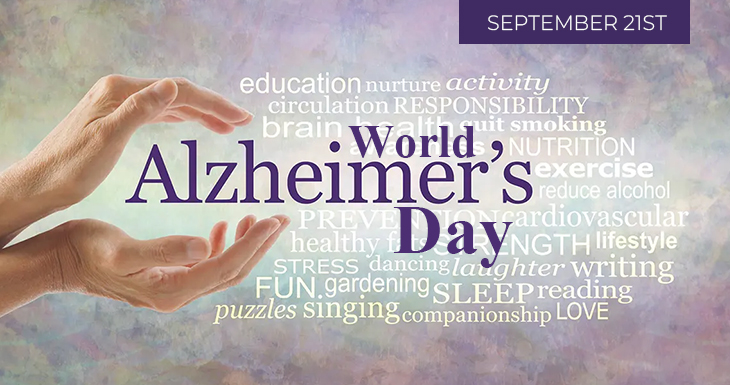On September 21, World Alzheimer's Day is celebrated, proclaimed by the World Health Organization (WHO) and sponsored by Alzheimer's Disease International (ADI).
Alzheimer's is a disease that generates progressive cognitive decline. This deterioration is usually accompanied by changes in personality and behavior. The ability of the person to be autonomous and carry out activities of daily living is decreasing, so that in the more advanced phases they will need help and care for most of the day.
The way of understanding the disease has evolved in recent years. It is now known that Alzheimer's is a long-lasting disease, which begins to damage the brain up to 15 to 20 years before the first symptoms appear. This finding has opened the door to investigate how to prevent its development. In this context, experts also bet on prevention studies, aimed at cognitively healthy people or with very mild symptoms. It is about acting before the neuronal loss of considerable magnitude that leads to the onset of dementia occurs.
The diagnosis of Alzheimer's disease depends on the coincidence of a series of clinical manifestations of cognitive problems, accompanied by functional limitations and sometimes also by other behavioral and psychological symptoms.
However, there are other illnesses or health problems that can have similar manifestations (mainly stress or depression, and other medical illnesses). This is why diagnosing this disease is not easy.
Some of the early signs and symptoms of Alzheimer's are:
- Memory impairment, such as trouble remembering events
- Difficulty concentrating, planning, or problem solving
- Trouble completing daily tasks at home or work
- Confusion regarding places or the passage of timepo
- Visual or spatial difficulties, such as not understanding distances when driving, getting lost, or putting things in the wrong places
- Language problems, such as trouble finding words or reduced vocabulary when speaking or writing
- Poor judgment when making decisions
- Withdrawing from work events or social engagements
- Mood changes, such as depression or other changes in behavior and personality
Early tests to detect Alzheimer's:
Doctors, by taking a careful medical history, and confirming the existence of the alterations generally commented on by a family member or caregiver, verify that the person meets the AE criteria or not, and it is at that time that it is performed. Other complementary tests in order to rule out that the alterations that the person presents are due to other diseases (infections, tumors, etc.):
- Laboratory tests: to rule out other conditions that cause some symptoms similar to Alzheimer's dementia, such as thyroid disorders or vitamin B12 deficiency.
- CT scan: uses x-rays to obtain cross-sectional images of the brain.
- MRI: uses powerful radio waves and magnets to create a detailed image of the brain.
- Cerebrospinal fluid analysis: This is a group of tests that examines the cerebrospinal fluid to help diagnose diseases and abnormalities that affect the brain.
Although there is still no proven strategy to prevent Alzheimer's, there is strong evidence that several factors related to a healthy lifestyle can have a positive effect on reducing the risk of developing this disease.
- Healthy diet and restful sleep. It is essential to eat a healthy diet and sleep well to prevent cognitive impairments that can lead to some type of neurological problem such as Alzheimer's.
- Do moderate physical exercise. Any activity adapted to the characteristics of each person is healthy. Physical activity appears to help the brain not only maintain blood flow but also increase chemicals that protect the brain. Physical activity also often counteracts some of the natural reduction in brain wiring that occurs with age. So it is important to pose small challenges to our mind.
- Posing small challenges to our mind. Participating in courses, reading or solving crosswords are some examples of activities to keep the brain active.
- Have an active social life. Relating and being in contact with the family environment and the circle of friends, as well as meeting new people, is beneficial for the brain.
The World Health Organization and Alzheimer's Disease International emphasize remembering that the most important thing is early diagnosis, which helps the patient, their family and those responsible for their care to plan for the future. In addition, doctors can teach them strategies to improve the living environment, establish routines, plan activities, and monitor changes in skills to minimize the effect of the disease on daily life.
FUENTE:
- www.knowalzheimer.com


